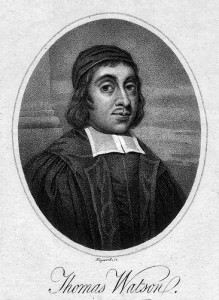
Thomas Watson
1620-1686
Thomas Watson was of the group known as Non-conformist. The exact date of his birth is unknown but it is know that he died at Barnston in 1686. He was educated at Emanuel College, Cambridge, where he was noted for remarkably intense study. And in 1646 was appointed to preach at St Stephen's, Walbrook, a sixteen year pastorate.
He showed strong Presbyterian views during the civil war, with, however, an attachment for the king; because of his share in Love’s plot to recall Charles II of England. He was imprisoned in 1651, but was released and reinstated vicar of St. Stephen's in 1652. He acquired fame as a preacher, but in 1662 was ejected at the Restoration for nonconformity. He continued to exercise his ministry privately as he found opportunity.
In 1672 after the declaration of indulgence he obtained a license for Crosby Hall, where he preached for several years, until his retirement to Barnston, Essex upon the failure of his heath, where he died suddenly while praying in secret. He was buried on 28 July 1686.
Watson was a man of learning, and acquired fame by his quaint devotional and expository writings. Of his many works may be mentioned, The Art of Divine Contentment (London, 1653); The Saint's Delight (1657); Jerusalem's Glory (1661); Divine Cordial (1663); The Godly Man's Picture (1666); The Holy Eucharist (1668); Heaven Taken by Storm (1669); and A Body of Practical Divinity; … One Hundred Seventy Six Sermons on the Lesser Catechism (1692).